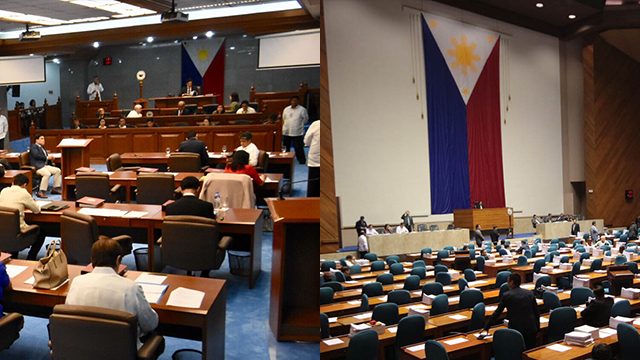SUMMARY
This is AI generated summarization, which may have errors. For context, always refer to the full article.

MANILA, Philippines – Working overnight from their last session day, senators voted unanimously to approve the proposed Bangsamoro Basic Law (BBL), which seeks to abolish the Autonomous Region in Muslim Mindanao (ARMM) and replace it with a new Bangsamoro region, hours after the House of Representatives did the same.
President Rodrigo Duterte earlier certified the BBL as urgent, allowing the House and the Senate to pass their own versions of the bill on 2nd and 3rd readings one after another. The House approved its version on final reading Wednesday, May 30; the Senate, past midnight of Thursday, May 31.
The Senate version is way different from the original proposal of the Bangsamoro Transition Commission (BTC).
With this, a bicameral conference committee is expected to be bloody due to the major differences of the two versions. Congress is set to convene a bicam during the break. Both chambers would have to ratify the reconciled version on the morning of July 23, during the opening of the 3rd regular session of the 17th Congress.
Duterte, in turn, could sign it into law before he delivers his 3rd State of the Nation Address in the afternoon of July 23.
Under the Senate bill, the reserved powers were abolished upon the proposal of Minority Leader Franklin Drilon. Reserved powers are those retained by the central government.
Drilon said there is no need to reiterate this, as the 1987 Constitution already states that the powers not granted to autonomous states automatically belong to the national government.
The Senate also abolished the proposed power of the Bangsamoro government to create, divide, merge, abolish, or substantially alter provinces and cities.
Citing a court decision and the Constitution, Drilon argued that only Congress could create provinces and cities.
The House version included a provision that states only one plebiscite would be held between 90 and 120 days upon the BBL’s effectivity. Originally, a plebiscite is mandated to be held every 5 years for a period of 25 years after the creation of the Bangsamoro. The House bill thus only gives one chance for cities and provinces sharing a common border with the Bangsamoro to join the plebiscite.
Fiscal autonomy, police force
Senators Panfilo Lacson and Gregorio Honasan II, meanwhile, ensured that the Bangsamoro police would be under the Philippine National Police, following the Constitution. In the House, more explicit provisions were introduced to say that uniformed services in the Bangsamoro would still be under the national government.
On fiscal autonomy, the Senate and the House both lowered the Bangsamoro region’s annual block grant or its share of the national internal revenue. From the proposed 6% or P72 billion, it is now down to 5% or P59 billion.
Under the proposed BBL, the region would enjoy the “maximum form of fiscal autonomy” and would be authorized to prepare and pass its own budget.
This is in stark contrast to the current system, where the ARMM is required to get congressional nod for funds and projects.
Also immediately after the ratification of the BBL, and for another 5 years, the national government shall provide additional funds that would subsidize expenditure for development projects and infrastructure. – with reports from Mara Cepeda/Rappler.com
Add a comment
How does this make you feel?
There are no comments yet. Add your comment to start the conversation.